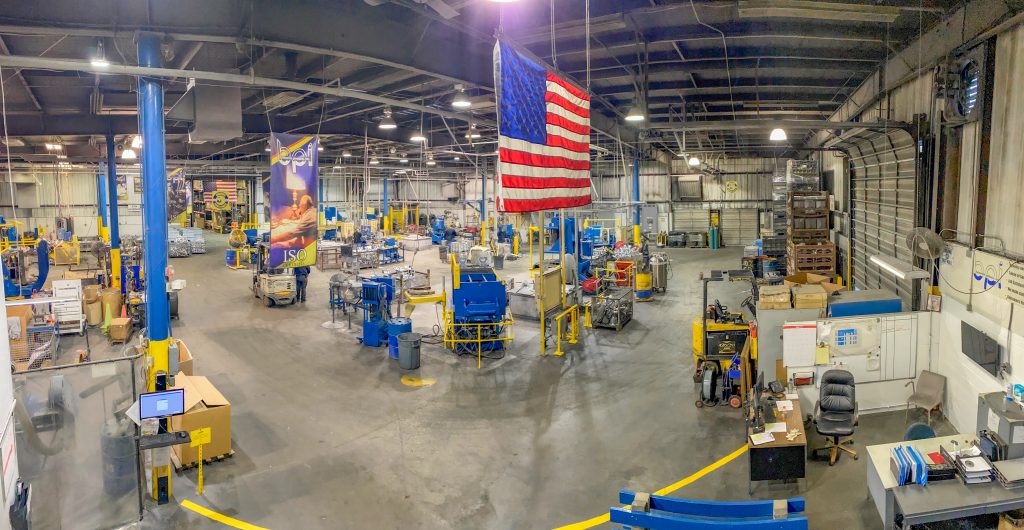If you’re looking for quality control, tighter supply chain, and product support, then onshoring is for you.
But here’s the truth: if you want these high value benefits of USA manufacturing, expect higher prices.
Why are offshore metal castings cheaper?
Consider all the labor involved in metal casting: designing the tool, manufacturing the tool, pouring, trimming, heat treating, machining, inspecting, polishing, and finishing.
Labor has the biggest impact on the cost difference between onshore and offshore manufacturing. The US has fair labor laws regarding wage, benefits, hours, and age. Additionally, the average cost of living is greater in the US than in China or India, influencing a higher wage.
Offshored products get away with cheaper price tags because of cheaper labor. This might rub you the wrong way for ethical reasons. But have you considered the difference in the level of care put into offshore labor and onshore labor?
At Batesville Products, we employ happy people who love what they do, and provide wages and benefits that support their families. Our team takes pride in their handcrafted work. With that comes a higher level of care for our customers. With perks such as a Finite Element Analysis during the tooling phase, which guarantees that you’re buying a mold that will make the best parts possible, decreasing scrap and increasing mold life. Or a First Article Inspection and regular quality checks along the way, which verify the parts we send you meet critical specs.
BUT Offshore parts may have some surprise costs not immediately apparent in the quote: overseas shipping, lots of scrap, poor quality procedures, excessive inventory, and strained communication.
Overseas shipping is a logistics nightmare. Expect long timelines, high costs, coordinating containers, and just hope your parts don’t end up at the bottom of the ocean.
Finally. You’ve been waiting months for your product to arrive. Your container is finally here! But when you open it up you realize… you have to scrap 25% of them.
You’re almost guaranteed to receive defective parts. It’s just a matter of how many.
What’s the supplier’s return policy? When you have bad parts from overseas, are you going to take the time and money to ship them back or just eat the cost? Most of the time, buyers just eat the cost and place even higher orders.
When you buy overseas, it only makes sense to buy in bulk. This offsets the shipping coordination and the percentage of scrap you’ll probably receive.
Buying in bulk means you’re responsible for holding more inventory. Excessive inventory means…
Is your purchasing team waking up in the middle of the night to talk to suppliers on the other side of the world? No one wants to do that. Are you willing to hire a quality team overseas?
Working with an overseas supplier strains communication. This means major time zone differences, less face-to-face meeting opportunities, and overcoming language/cultural differences.
Why onshore your metal castings?
It only makes sense to pay more for a higher value product. Get a quote today to onshore your casting.

The benefits of onshoring are a reliable supply chain, better quality control, streamlined shipping, better service and care, easier communication, and peace of mind.
Offshore products are cheaper due to lower labor costs. USA manufactures adhere to fair labor laws regarding wage, benefits, hours, and age.
Hidden costs include overseas shipping, lots of scrap due to poor quality procedures, excessive inventory, and strained communication.
Overseas shipping involves long timelines, high costs, coordinating containers, and the risk of parts being lost.
Buying in bulk overseas means holding more inventory, which leads to higher costs, reduced flexibility in product improvement, and increased market risk due to locked-in commitments.
Benefits of USA manufacturing include a reliable supply chain, better quality procedures, better service & level of care, easy communication, the power of stamping “made in USA” on your product, and peace of mind.
Working with overseas suppliers strains communication due to time zone differences, limited face-to-face meetings, and language/cultural barriers.
Onshored products offer higher value in terms of reliability, quality, service, communication, and the added benefit of supporting domestic manufacturing.
While offshore manufacturing may offer cheaper initial costs due to lower labor rates, it often comes with hidden expenses such as shipping costs, quality issues, and communication challenges. On the other hand, onshore manufacturing, though more expensive upfront, provides benefits like a reliable supply chain, better quality control, easier communication, and peace of mind.